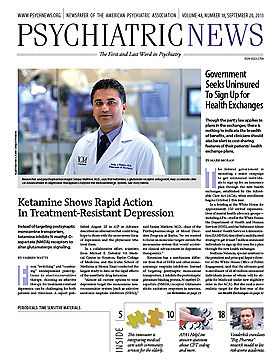The next time college students are tempted to drink to excess, they might want to worry not only about ending up in the hospital, but also about developing early-onset dementia.
This possibility may sound outlandish to them, but alcohol abuse has been found to be a prime risk factor for early-onset dementia—dementia beginning before age 65— in a large study published online August 12 in JAMA Internal Medicine.
The lead researcher, Peter Nordstrom, Ph.D., a professor in geriatric medicine at Umea University in Sweden, told Psychiatric News that he was surprised by this finding. “It seems that alcohol intoxication is a much stronger risk factor for early-onset dementia than anyone could have expected,” he said.
The focus of the study that Nordstrom and his colleagues conducted was some 500,000 men with an average age of 18 who had been conscripted for military service in Sweden between 1969 and 1979. They had all undergone extensive cognitive and medical examinations, the results of which were available to Nordstrom and his colleagues.
The researchers also obtained information about the subjects’ educational level and income 15 years after they had been conscripted. The researchers tracked the subjects’ biological parents through the Statistics Sweden database, which also gave information on which of the parents had developed dementia.
Medical information about the subjects in the years following conscription, including information on whether any developed early-onset dementia, was obtained through the Swedish National Hospital Discharge Patient Register or the Swedish National Drug Register.
It turned out that 487 subjects had developed early-onset dementia, at an average age of 54. The early-onset dementias included vascular dementia, frontal lobe dementia, Alzheimer’s disease, and dementia of an unspecified type.
Finally the researchers compared characteristics of the 487 subjects who had developed early-onset dementia with characteristics of the rest of the cohort and found that nine factors appeared to predict significantly increased risk of developing early-onset dementia.
Three of the risk factors—low level of cognitive function, short height, and high blood pressure—had been noted at the time of conscription-related evaluation. The remaining six—alcohol abuse, stroke, antipsychotic medication use, abuse of drugs other than alcohol, father’s dementia, and depression—had been identified during the years of follow-up.
The most potent risk factor was alcohol abuse. Those who had abused alcohol to the extent that they needed to be hospitalized were five times more likely to later develop early-onset dementia than subjects who were not known to be alcohol abusers and had never been hospitalized for this reason. The next most potent predictors were stroke and antipsychotic medication use.
In addition, the odds of developing early-onset dementia were twice as high for those who had been treated in the hospital for depression as for those who had not, and twice as high for those whose father had been diagnosed with dementia as for those whose father had not.
Further, men in the lowest third of cognitive function and with at least two other risk factors had a 20 times greater risk of developing early-onset dementia than had men in the highest third of cognitive function and with no risk factors.
Thus, while reducing excessive alcohol consumption in late adolescence might help prevent early-onset dementia, targeting high blood pressure in late adolescence might be another way to prevent the disorder, Deborah Levine, M.D., an assistant professor of medicine at the University of Michigan, suggested in an accompanying editorial. In fact, it might be a way to prevent late-onset dementia as well, since research has shown that high blood pressure in midlife is associated with late-onset dementia.
“Much of psychiatric research is moving toward prevention, and this article is another important step toward understanding prevention strategies for dementia,” Molly McVoy, M.D., training director of the Child and Adolescent Psychiatry Fellowship at University Hospitals/Case Western Reserve, told Psychiatric News. “The study’s strengths include the fact that initial assessments were conducted in person, by physicians, and the dementia diagnoses were confirmed by independent evaluators. Further studies will need to verify the risk factors presented in this article in a way other than by ICD coding—that is, by independent analysis—to avoid the confounding factors of using claims-made data without independent validation.”
The study was funded by the Swedish Research Council and the Swedish Dementia Foundation. ■

